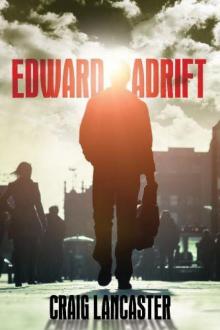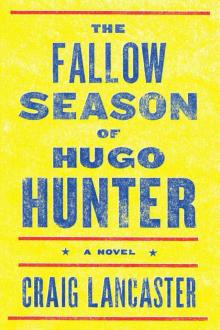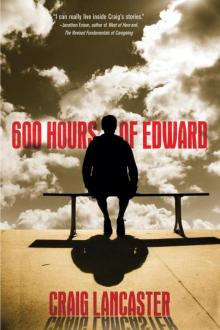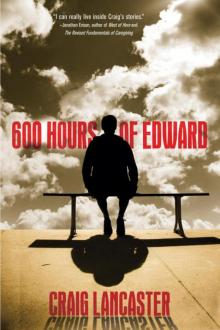- Home
- Craig Lancaster
Quantum Physics and the Art of Departure: Short Shories
Quantum Physics and the Art of Departure: Short Shories Read online
QUANTUM PHYSICS and the ART OF DEPARTURE
STORIES
by
Craig Lancaster
KINDLE EDITION
* * * * *
PUBLISHED BY:
Missouri Breaks Press
Copyright © 2012 by Craig Lancaster
The stories herein are works of fiction. Any characters or events bearing similarities to actual persons or occurrences is strictly coincidental.
Kindle Edition License Notes
This e-book is licensed for your personal enjoyment only. This e-book may not be re-sold, and it may be lent only by means set forth at the Amazon.com Kindle store. If you would like to share this book with another person, please do so as outlined at the Kindle store. If you're reading this book and did not purchase it, it was not properly lent to you or it was not purchased for your use only, then you should return to Amazon.com and purchase your own copy. Thank you for respecting the author's work.
* * * * *
CONTENTS
Somebody Has to Lose
This Is Butte. You Have Ten Minutes.
Alyssa Alights
Cruelty to Animals
Quantum Physics and the Art of Departure
The Paper Weight
Star of the North
She’s Gone
Sad Tomato: A Love Story
Comfort and Joy
Acknowledgments
About the author
Praise
* * * * *
SOMEBODY HAS TO LOSE
FROM THE Burdon County Bugle, November 4, 1997:
Longtime residents of these parts know what they were doing on this date 12 years ago – Nov. 4, 1985. They were settled in front of their television sets to watch 3-year-old Mendy Grunwald, from right here in Burdon City, make an appearance on “The Tonight Show with Johnny Carson.”
Well, little Mendy did herself and the whole county – heck, the whole state – proud by sinking 10 shots in a row with a foam ball into a basket rigged up for the pint-sized point guard she was that evening. After this display of shooting prowess, Johnny Carson challenged her to H-O-R-S-E, and she dispatched the comedian in five shots, earning the admiration of her host and the adulation of a nationwide TV audience.
Things haven’t been the same for Burdon County or Mendy Grunwald since. The hoopla lasted awhile after she and her parents returned home from California (she was even featured in People magazine), and in the ensuing years, Mendy has gone on to be every bit the basketball star everyone expected her to be.
This is all worth mentioning now as she is finally 15 years old, finally a high school freshman, and finally eligible to play for coach Paul Wainwright and the Burdon County Broncos. Practice starts today, and it’s safe to say that with Mendy Grunwald in the fold, folks around here expect the Broncos to end a 10-year state title drought and hang banner No. 9 from the rafters….
Some men trust their eyes, some their heart. That first week in November, as always, Paul Wainwright put his faith in his nose.
On the first day of practice, the particular odor in the gymnasium told him that he again had come to where he belonged. It teased his nostrils even before he pushed through the swinging double doors, beckoning him onward as he walked through the dank tunnel that connected the locker room and coaches’ offices to the hardwood, past the orange-painted cinderblock walls bearing the pictures of players who were ghosts now at Burdon County High School but remained forever fifteen, sixteen, seventeen, eighteen years old in Paul’s head. He next passed under those stands that held the faithful, year after year, thousands of faces that he knew together and alone. His anxious footsteps, beating out a rhythm in time and a half just this once, every year, echoed through the empty gym. First week of November. In more than half of the years of his life, Paul Wainwright had made this inaugural walk, pulled along by the pungency from generations of sweat mixed with the body heat of a thousand crowds, the leavings of leather against wood, of sneaker soles and desire and heartbreak and euphoria. The reason he kept showing up, for a quarter century now, lay in the corners of the gym that never got swept, in that worn spot along the baseline where every player he’d ever coached had stood, in the peeling paint of the scorer’s table, in the steel beams crossing the ceiling where now he looked and silently counted off his legacy teams—1974, 1975, 1978, 1979, 1980, 1983, 1984, 1986, state champions all. Paul Wainwright strode into the gym and saw signs, visible only to him, that marked the route he had traveled as a high school basketball coach. Down on the north end of the gym, forty-five degrees up and out from the free-throw line, lay the spot where Wendy McCaig’s heave left her fingers in ’74, falling through the basket at the buzzer, sending Paul’s first team into the playoffs on a high. East regionals, state, home with the trophy, the start of it all. As close as Paul held the memory of that shot, and of Wendy, he remembered the setup pass even more clearly. Valerie Sneed then, Valerie Wainwright today, seeing the big center from Laurel flailing toward her, slipping a bounce pass eight feet to her right to Wendy, wide open.
Draw that line back across the lane, bisecting it, to the left block, and that’s where Dana Winslow crawled through a thicket of girls for an offensive rebound and a flash layup in ’83 against Dawson County, giving the Broncos an unlikely ticket to the playoffs and a state championship that astounded even Paul, that he could win with so flawed a team. He could draw lines all over this gym, perpendiculars and parallels and squiggles, and at each endpoint, a memory posted up.
Paul stood in the center circle, the whistle around his neck dangling against his black polo shirt, and went over his notes. To someone in the know, it would have seemed silly for him to have written it all down—twenty-five years into a routine that seldom changed, Paul could run his practices by rote—but he drew comfort from the exercise. In precise script, he had practice segmented perfectly, from basic dribbling drills to layup lines to the first wave of installing the offense. Paul felt fortunate that he had long ago persuaded youth league and junior high coaches in town to adopt a basic version of his set; it meant that he could quickly bring the girls up to speed every November before taking them even deeper, into the multiple options and cuts to which they had not yet been exposed. In two hours, he would know exactly who was going where —in addition to the varsity, his primary concern, he would have to fill junior varsity and C teams—and what, exactly, he’d have to work with for the next few months.
“Think fast,” Susie Michener said, and the sound of the flung ball slapping against the hardwood pulled Paul’s attention from his notes. He reached out a hand, and the ball stuck. It always did
“You ready, Coach?” she asked.
“Oh, yeah. They ready?” He grinned at his first-year assistant, the star of his last championship team, a group now a decade in the rearview mirror. He had persuaded Susie to come home and, he hoped, let him slide away from the job in a few years, if his nose ever told him it was time to go.
“They’ll be out soon,” Susie said. She slapped at the ball in his hands, stealing it. Paul dropped his notes and scrambled into a defensive stance, playfully daring his erstwhile guard to make a move. She jab-stepped at him, smiled and then slipped the ball under her arm.
“What do you think, Coach?” she asked. “Do you think we’re going to be any good?”
Paul reached for the scattered sheaf of papers. He looked back to the rafters. “You’re the last one in Burdon City to know what that’s like,” he said, his eyes guiding her to the banners. “To know what it takes. You and me, and that’s it. But I tell you what: In a few months, I think we’ll have ten, twe
lve girls who know the feeling.”
Susie looked at Paul, but he kept his eyes tilted toward the ceiling. “I’ve never heard you talk like that before,” she said. “Were you this confident when I played?”
The sound of the double doors swinging open drew their attention. Mendy Grunwald, socks flopping down her long legs like loose skin, waved.
“Start stretching, Mendy, while we wait for everybody else,” Paul said. And then, to Susie, low so only she could hear: “You never played with anybody like we’ve got coming.”
Paul started with the simple stuff: layup lines to get the kids used to the feel of the ball and their movements with it. Three or four dribbles, plant a foot, go to the basket. One line of shooters, one line of fetchers. The first girl to shoot, a freshman named Oberst, drew a clank of iron, the ball ricocheting back at her. She ducked as it flew past.
“That’s a lap,” Paul said, and Oberst peeled out of line and began her plodding trip around the periphery.
Mendy was next. Two dribbles and she was off her feet, laying the ball gently against the glass, underhanded. It dropped through.
Motion drills were more of the same. Mendy was quicker out of the blocks, longer, more fluid than the other girls, moving seamlessly from one drill to the next, her long, slender, sure legs carrying her across large gaps of hardwood with quickness and grace. One of the things Paul had to get used to, years earlier when he was starting out as a scared young coach, was the peculiar way many girls moved. Basketball maneuvers didn’t come naturally to them; the motions were learned behaviors, and they often came across in herky-jerky fashion.
It had never occurred to Mendy to play that way. Paul had known her since she was a baby, and for most of that time, she had carried a basketball. It was almost an extension of her, a part of her body. Here she was, a six-foot, two-inch freshman, growth and muscle maturity still well ahead of her, and already she had more talent than Paul had seen in Burdon County, or anywhere else. When Mendy caught him grinning, he winked at her.
By the time the juniors and seniors reported for practice, an hour in, Paul had seen enough. As per usual, the freshmen—Mendy excepted—and all but two sophomores would be dropped to the junior varsity and C teams, returned to the slow cooker of the lower levels for more seasoning. He sent those girls to one end of the gym with Susie and turned his focus to the ten who had made the cut. Looking at them together, he saw more possibilities than he had allowed himself to dream of in the parched decade behind him.
There was Reese Cacciola, a senior point guard. Paul didn’t much like her mouth, but he loved the way “Cash” would crawl inside the jersey of an opposing player, never yielding, never stopping. He’d put Sabrina Newman, a junior, at one of the wings. He could find more talent down on the other end of the court with Susie’s group, but Paul figured Sabrina’s hustle would win a game, maybe two, and that could mean everything. Another junior, Victoria Ford, would start in the backcourt opposite Cash. Senior Vanessa Samples, the only black girl on the team (one of only four in the whole town) was a tree trunk anchor for the middle. Nancy Plummer, Amanda Newman, Jana Lundquist and Sandy Madsen would hold down the bench and provide depth the likes of which Paul hadn’t seen in a long while.
That left Mendy.
“Mendy can play anywhere,” he told Susie, side-mouthed, toward the end of practice, as the girls ran yo-yos—sprints from baseline to free-throw line, from baseline to midcourt, from baseline to the far free-throw line, from baseline to baseline.
“We knew that, right?” Susie said.
“Yeah, but knowing it and seeing it … come on, Suze, imagine the possibilities. You know what we can do with her handling the ball?”
“Pick-and-rolls up high.”
“Yep. We can pick teams to death. On defense, we can double-team anywhere on the court and let her play center field. We can use her as a decoy. We can shut down half the floor and dare individual players to beat us. It opens up everything.”
Susie frowned.
“What?” Paul said.
“We’ve gotta be careful, you know. Cash figures this is her team, her year. It could be a chemistry problem.”
Paul waved her off. “Cash will be fine. She’s smart enough to understand what’s happening.”
“Smarts aren’t the question, Coach. She spent her summer at Blue Star and AAU camps. By her thinking, it’s her moment. I’m just saying, it’ll be better if the team doesn’t perceive that there’s a star system here.”
“There’s not.”
“No, of course …”
“We’re running the same sets we always run, the same options, everything,” Paul said, and he was immediately taken aback by his apparent peevishness. “Only the players have changed, and in one case, significantly. They’ll understand that.”
Their drill finished, the girls lingered on the baseline, lacing their hands behind their heads and gulping air.
“Grab some water and then huddle up,” Paul said, and the girls stampeded toward the hallway.
“Coach?” Susie said.
“Yeah?”
“All I’m saying is, be sure you ride Mendy just as hard as you do the others, if not harder. They’ll be watching you, watching us, to see how she’s treated. They know how good she is. Plus, Mendy can take it.”
“Hands in, Broncos,” Paul said, holding his right arm up and out, his palm stretched perpendicular to the ground. The girls crowded in and reached for his hand.
“One week from today, we play Custer County,” he said. “That’s as much of the schedule as you need to think about. A lot of people around us seem to be interested in what’s happening in February and March, but that is not our concern, so when we’re here, together, I don’t want to hear a word about it, okay?” He scanned the eyes looking back at him, making contact with each set. “A lot of people will talk to you about what it means to be a Bronco. They’ll tell you that you have to live up to something. You do, but it’s not what they’re saying. You have to live up to your own duty to play as hard as you can, every minute, every step of the way. You show up to practice ready to go, out of respect to yourself and your team. You back each other up. You will never go wrong here if I have your complete effort, all the time. If you give this team less than that, you will not last. Those who play for the team will not let you stay. Do you understand?” The girls all nodded. “You pay attention, you learn, you apply what you’ve learned on that basketball court, and I guarantee you, the rest will take care of itself. This is our journey, together, and it belongs to us. Do you hear me?”
“Yes, sir,” the girls shouted.
“Okay, let’s break it down. ‘Team’ on three. One, two, three …”
In unison came the shout: “Team!”
Mendy Grunwald slung the backpack off her shoulders, opened the pickup door and dropped the bag into the rear of the cab as she settled into the seat. Dirk Grunwald patted his daughter’s leg.
“What’s wrong, sweetie?”
“Nothing.”
“Where’s the smile?”
“Taking a break.”
Dirk put the truck in gear. “First day of practice, I expected a little more enthusiasm. Things not go well?”
Mendy tinkered with the truck’s radio, moving the dial off Dirk’s preferred country and western and finding something more palatable on the town’s only FM station, a hundred-watt basement outfit anchored by a morning deejay-sidekick combination who called themselves T.J. and the Rake. Now, by late afternoon, the morning duo was probably halfway into a case of Keystone and the station was on autopilot, pumping out tunes and commercials (Big Bone Bail Bonds being a prime sponsor) in monetarily pleasing proportions. Dirk, who forbade his only child from listening to T.J. and especially the overly salacious Rake, decided to tolerate the shift in tone.
“Practice went fine. I really like the girls,” Mendy said. “It’s just …”
Dirk, piloting the pickup down Burdon City’s main drag, looked sideways at hi
s daughter. “Just what?”
“The other girls don’t always see what I see. I hit two of them in the face with passes today. They were open, but they didn’t know it. I really felt bad.”
Dirk chuckled even as his girl sat quiet in her seat. Mendy’s wide-eyed innocence was perhaps his favorite thing about her; he loved that she could be so astoundingly good at something and yet not recognize her own talent enough to be arrogant about it. From the very beginning, he had approached her basketball playing from divergent points of view. On one hand, he felt boundless pride in her ability and potential, knowing that the game could carry her to incredible opportunities. On the other, he braced for the day that renown would somehow fundamentally alter her, chipping away at the underlying sweetness and replacing naivete with hard jadedness. It hadn’t happened yet, thank the Lord, but high school ball—at this high school in particular, for this coach in particular—would ratchet the pressure on her, he knew.
“Honey, let that go. It’s the first day. They’ll get used to you, and you’ll get used to them. What else is going on?”
Mendy stared at the floorboard.
“Mend?”
She looked up, red-eyed.
“Cash.”
“Cash what?”
“You know, Reese Cacciola.”
“Oh, right. What about her?”
“Dad, I think she hates me.”
Dirk looked at his daughter, who could no longer fight off the tears. “Oh, honey, nobody hates you. That’s silly.”
“She teased me the whole time. Asked me if I’d ever missed a shot. Said she figured no one else would have to shoot with me on the team.”
Dirk reached across the bench seat and tucked his daughter’s long blond hair behind her ear. “Honey, it sounds like she’s just having some fun with a newbie. You knew this was coming. We talked about it.”

 Edward Adrift
Edward Adrift The Fallow Season of Hugo Hunter
The Fallow Season of Hugo Hunter Quantum Physics and the Art of Departure: Short Shories
Quantum Physics and the Art of Departure: Short Shories 600 Hours of Edward e-1
600 Hours of Edward e-1 600 Hours of Edward
600 Hours of Edward Edward Adrift e-2
Edward Adrift e-2 This Is What I Want
This Is What I Want